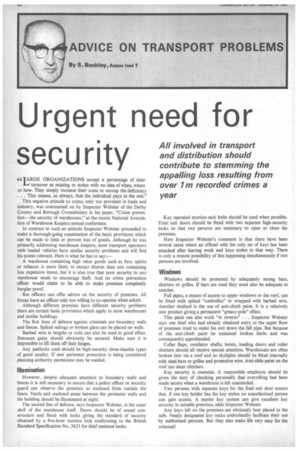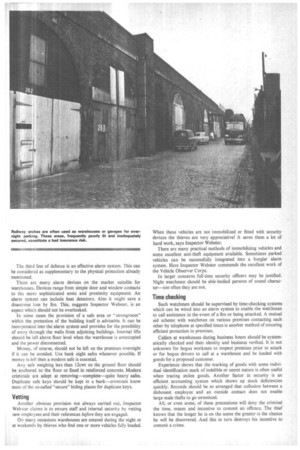Urgent need for security
Page 64

Page 65

If you've noticed an error in this article please click here to report it so we can fix it.
44 TARGE ORGANIZATIONS accept a percentage of their
la turnover as missing or stolen with no idea of when, where or how. They simply increase their costs to recoup the deficiency . . . This means, as always, that the individual pays in the end."
This negative attitude to crime, only too prevalent in trade and industry, was commented on by Inspector Webster of the Derby County and Borough Constabulary in his paper, "Crime preven
tion the security of warehouses," at the recent National Association of Warehouse Keepers annual conference.
In contrast to such an attitude Inspector Webster proceeded to make a thorough-going examination of the basic provisions which can be made to limit or prevent loss of goods. Although he was primarily addressing warehouse keepers, most transport operators with loaded vehicles have similar security problems and will find his points relevant. Here is what he has to say:— A warehouse containing high value goods such as furs, spirits or tobacco is more likely to attract thieves than one containing less expensive items; but it is also true that poor security in any warehouse tends to encourage theft. And no crime prevention officer would claim to be able to make premises completely burglar-proof.
But officers can offer advice on the security of premises. All forces have an officer only too willing to co-operate when asked.
Although different premises have different security problems there are certain basic provisions which apply to most warehouses and similar buildings.
The first lines of defence against criminals are boundary walls and fences. Spiked railings or broken glass can be placed on walls.
Barbed wire in lengths or coils can also be used to good effect. Entrance gates should obviously be secured. Make sure it is impossible to lift them off their hinges.
Any padlocks used should be high-security close-shackle types of good quality. If new perimeter protection is being considered planning authority permission may be needed.
Illumination
However, despite adequate attention to boundary walls and fences it is still necessary to ensure that a police officer or security guard can observe the premises so enclosed from outside the fence. Yards and enclosed areas between the perimeter walls and the building should be illuminated at night.
The second line of defence, says Inspector Webster, is the outer shell of the warehouse itself. Doors should be of sound construction and fitted with locks giving the standard of security obtained by a five-lever mortice lock conforming to the British Standard Specification No. 3621 for thief resistant locks. Key operated mortice-rack bolts should be used when possible. Final exit doors should be fitted with two separate high-security locks so that two persons are necessary to open or close the premises.
Here Inspector Webster's comment is that there have been several cases where an official with the only set of keys has been attacked after leaving work and keys stolen in that way. There is only a remote possibility of this happening simultaneously if two persons are involved.
Windows
Windows should be protected by adequately strong bars, shutters or grilles. If bars are used they must also be adequate in number.
Fall pipes, a means of access to upper windows or the roof, can be fitted with spiked "umbrellas" or wrapped with barbed wire. Another method is the use of anti-climb paint. It is a relatively new product giving a permanent "greasy-pole" effect.
This paint can also work "in reverse" . . Inspector Webster says one thief who had already obtained entry to the upper floor of premises tried to make his exit down the fall pipe. But because of the anti-climb paint he sustained broken limbs and was consequently apprehended.
Cellar flaps, ventilator shafts, hoists, loading doors and roller shutters should all receive special attention. Warehouses are often broken into via a roof and so skylights should be fitted internally with steel bars or grilles and protective wire. Anti-slide paint on the roof can deter climbers.
Key security is essential. A responsible employee should be given the duty of checking personally that everything had been made secure when a warehouse is left unattended.
Two persons with separate keys for the final exit door ensure that, if one key holder has his key stolen no unauthorized person can gain access. A master key system can give excellent key security in suitable premises, adds Inspector Webster.
Any keys left on the premises are obviously best placed in the safe. Neatly designated key racks undoubtedly facilitate their use by authorized persons. But they also make life very easy for the criminal! The third line of defence is an effective alarm system. This can be considered as supplementary to the physical protection already mentioned.
There are many alarm devices on the market suitable for warehouses. Devices range from simple door and window contacts to the more sophisticated sonic and proximity equipment. An alarm system can include heat detectors. Also it might save a disastrous loss by fire. This, suggests Inspector Webster, is an aspect which should not be overlooked.
In some cases the provision of a safe area or "strongroom" within the protection of the building itself is advisable. it can be incorporated into the alarm system and provides for the possibility of entry through the walls from adjoining buildings. Internal lifts should be left above floor level when the warehouse is unoccupied and the power disconnected.
Money, of course, should not be left on the premises overnight if it can be avoided. Use bank night safes whenever possible. If money is left then a modern safe is essential.
Any safe weighing less than 12cwt on the ground floor should be anchored to the floor or fixed in reinforced concrete. Modern criminals are adept at removing—complete—quite heavy safes. Duplicate safe keys should be kept in a bank—criminals know most of the so-called "secure" hiding places for duplicate keys.
Vetting Another obvious provision not always carried out, Inspector Webster claims is to ensure staff and internal security by vetting new employees and their references before they are engaged.
On many occasions warehouses are entered during the night or at weekends by thieves who find one or more vehicles fully loaded. When these vehicles are not immobilized or fitted with security devices the thieves are very appreciative! It saves them a lot of hard work, says Inspector Webster.
There are many practical methods of immobilizing vehicles and some excellent anti-theft equipment available. Sometimes parked vehicles can be successfully integrated into a burglar alarm system. Here Inspector Webster commends the excellent work of the Vehicle Observer Corps.
In larger concerns full-time security officers may be justified. Night watchmen should be able-bodied persons of sound character—too often they are not.
lime checking
Such watchmen should be supervised by time-checking systems which can be wired into an alarm system to enable the watchman to call assistance in the event of a fire or being attacked. A mutual aid scheme with watchmen on various premises contacting each other by telephone at specified times is another method of ensuring efficient protection to premises.
Callers at warehouses during business hours should be systematically checked and their identity and business verified. It is not unknown for bogus workmen to inspect premises prior to attack or for bogus drivers to call at a warehouse and be loaded with goods for a proposed customer.
Experience shows that the marking of goods with some individual identification mark of indelible or secret nature is often useful when tracing stolen goods. Another factor in security is an efficient accounting system which shows up stock deficiencies quickly. Records should be so arranged that collusion between a dishonest employee and an outside contact does not enable large-scale thefts to go unnoticed.
All, or even some, of these precautions will deny the criminal the time, means and incentive to commit an offence. The thief knows that the longer he is on the scene the greater is the chance he will be discovered. And this in turn destroys his incentive to commit a crime.












































































































































